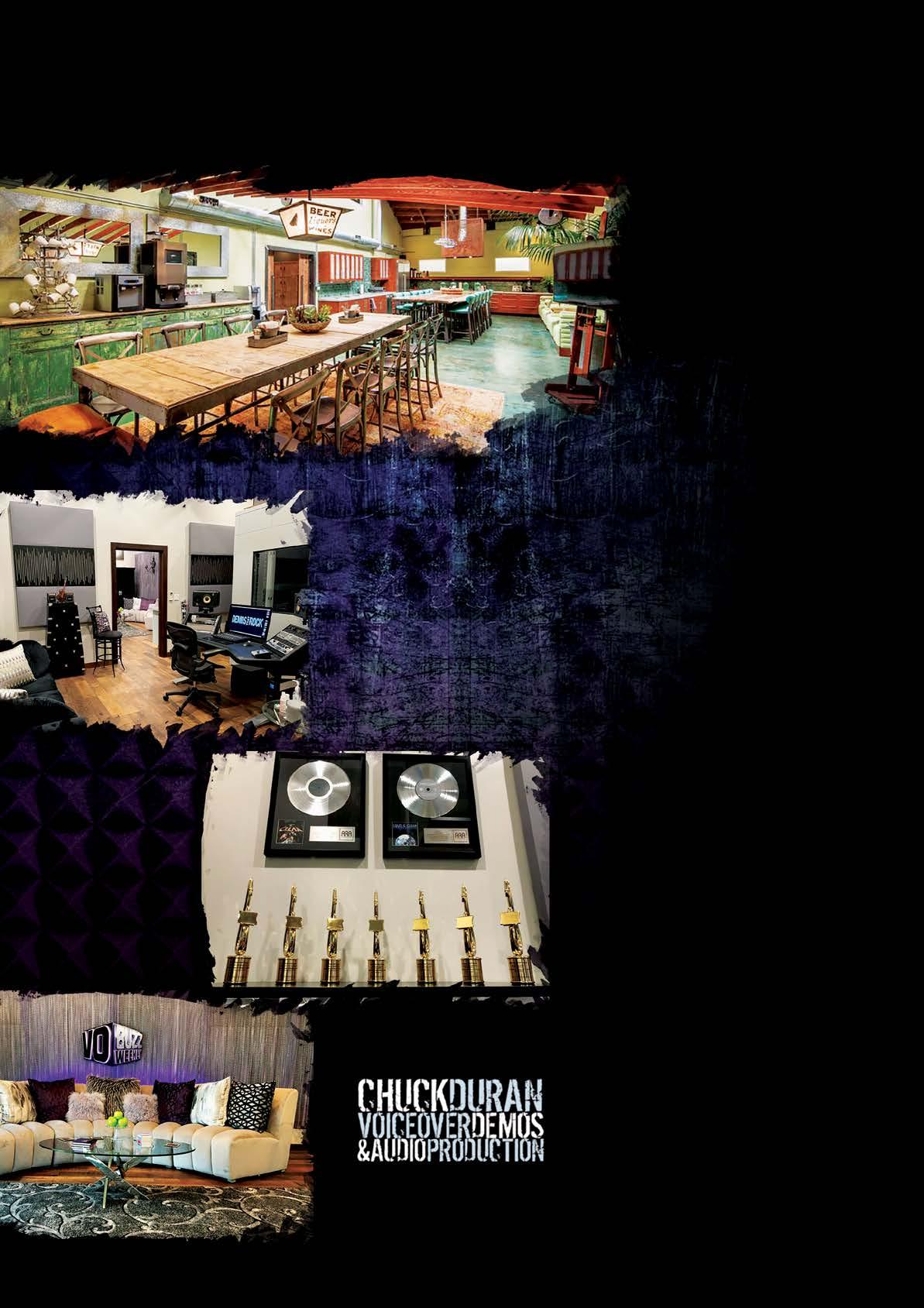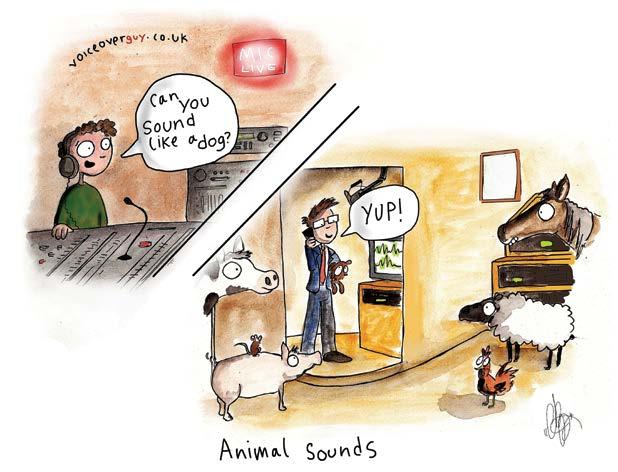
5 minute read
as aVoiceover Artist
When voice over actors are asked about what they do they often joke that they spend all day in a padded room talking to themselves. In large part that is physically true and a far way from dance where our minds often conjure up vibrant movements and fluid choreography. But the joke doesn't capture the full experience of what a good voice over actor does. These talented individuals possess the power to breathe life into characters, narrate stories, and create an enchanting audio experience that paints the imagination with a vibrant mural of words. But just like a dancer relies on their body, a voice over artist relies on the delicate instrument that is their voice. In this article, we delve into the importance of vocal health for voice over actors and provide five essential tips to keep their voices strong, clear, and captivating.
THE IMPORTANCE OF VOCAL HEALTH:
Advertisement
Vocal health plays a crucial role in the life of a voice over artist. A neglected voice can lead to strain, fatigue, and even potential damage, hindering your ability to deliver compelling performances consistently. Protecting and enhancing your vocal health allows you to maintain vocal stamina, project a clear and resonant tone, and adapt your voice to various roles and genres. Just like a dancer must condition their body, a voice over artist must prioritize vocal well-being to achieve excellence.
THE VOICE AS THE DANCER'S INSTRUMENT:
As a voice over artist, your voice is your most valuable tool—a precious instrument that requires constant care and attention. Like a skilled dancer, you must understand your voice's capabilities, its limitations, and how to push its boundaries while keeping it healthy. By nurturing your vocal health, you can maintain a remarkable range, excellent articulation, and expressive nuances that truly make your performances shine.
Hydration
Water, the dancer's nectar, is also vital for vocal health. Stay hydrated by drinking plenty of water throughout the day to ensure your vocal folds remain lubricated. Avoid excessive caffeine and alcohol consumption, as they can dehydrate your body and impact your vocal performance.

Vocal Rest
Just like dancers need rest days to prevent overexertion, voice over actors should schedule vocal rest periods. Limit excessive talking or shouting, especially in noisy environments, and avoid speaking forcefully when your voice feels tired or strained. Give your vocal folds time to recover and rejuvenate.
VOCAL WARM-UPS
Just as dancers stretch and warm up their bodies, voice over actors must prepare their voices before any performance. Engage in vocal warmup exercises to loosen your vocal cords, improve blood circulation, and enhance your vocal range. Simple exercises like humming, lip trills, and tongue twisters can work wonders.

Professional Guidance
Seek the expertise of a speech therapist or vocal coach specializing in voice over work. They can provide personalized advice, exercises, and techniques to help you optimize your vocal performance, overcome specific challenges, and prevent potential vocal problems.

Proper Breathing Techniques
Effective breathing is the backbone of a dancer's movements, and it also plays a vital role in vocal production. Practice diaphragmatic breathing to support your voice, increase airflow, and reduce strain on your vocal folds. Deep breaths allow you to control your voice with precision and maintain vocal power and consistency.
Where emotion and expression intertwine, the voice over artist stands as a powerful force. Understanding the significance of vocal health is crucial if you wish to excel in this art form. By following these five tips—hydration, vocal warm-ups, proper breathing techniques, vocal rest, and seeking professional guidance—you can protect and nurture your voice, ensuring it remains a captivating instrument that dances effortlessly through the airwaves.
So, let us dance to the rhythm of vocal health, cherishing your voice, and embracing the extraordinary possibilities that lie within the art of voice over.


Tell us about you
My name is Ali-like the boxer- Cheff. I love smiles, stories, hugs and smells. I am grateful for experiences each day. Perhaps it is the way of an actor but I will be sobbing or angry or awkward and so so icky from embarrassment and think “Yes, feelings. Gotta hold on to this one.” I have lived many lives and always have ideas to create.
I started acting at 6. We did Shakespeare over a summer, a homeschool group. Then a friend's mom wrote some plays which we performed at their house. Did musicals over the summers that my voice teacher put on and then was given a chance by my Latin and Greek teacher to be the lead in a play. It was the greatest gift, to say: create and play, you are allowed to feel and share the story.
I had a rural life growing up swimming in the river, hiking, riding bikes and horses. Then went to Europe, to Germany to stay with a friend’s family, and attended James Madison University. Kept traveling, went to London with dance professors. Began clowning with Patch Adams in Peru, did that for 14 years in the summers. Had every job around. Had an experimental theatre company. Played Bike Polo internationally. I got into working in front of the camera and crew and casting. Spent 4 years filming the process of the ERA (Equal Rights Amendment) campaign in Virginia, USA,. So much learning and amazing stories gathered from the citizens pushing for legislature change. I love all animals. My support
Ali Cheff
system has been my late cat June, who gave me love and independence, and then a dog Wambam Shazam, who made me get more focused with my work, because he demanded more from me, teaching me being intentional with time, but gave lots of cuddles.
How did you get into Voiceover?


My mom, cassette tapes, and through acting on stage and screen. I used to make cassette tapes and CDs for friends for their road trips. I would read stories and put them down. Then Mom decided she wanted to make a cartoon and hired me to do multiple voices. After that a professor at university who I babysat for, was leaving an e-learning position and suggested I audition and I haven’t stopped since.
What is one thing you wished you had known when you started?
Learn your equipment, how it all functions. I knew enough to make sure I recorded at the correct time, 1am -3am, so it was quiet, and had a mic that was good but not too good. (I lived in a yurt when I started so it was just canvas between me and all the farm animals). I had vocal training from years of singing and theatre, so I was able to start with more training than some. I did not understand totally how interfaces worked and I had to stumble through Audacity. So I would have loved to have watched tutorials more. To know about the community of Voice Actors like we have at The VoiceOver Network and Closing Credits, which I have found the greatest communities of support and inspiration with these. Reading the instructions carefully is a big one. Oh, and play- never think the job is more important than playing and performing the story.
What has been your favourite job and why?
Really, I loved doing an educational animation called 1st Cases because at one moment in session, this was in studio, the director realized that the next scene I was all 5 kids so I was talking to my self the whole scene. I also could say recording my friends’ books, being a warrior in space for a video game, a commercial where we did a live direct. There is no favorite because I feel like I get to play, learn and perform all at once with the acting.
What is your home studio set up?
Currently I have a more fancy set up, I have a small whisperroom with additional ATS panels and dual monitors, a proper monitor and an ipad (use the sidecar function). I have a Senn 416, a Townsend Labs Sphere l22, Presonus Revelator io24, Gater Boom arm, Hook pop filter and JZ pop filter. Finger puppets, a kidney bean doll, Monitor mounts. Logic Pro, Hindenburg Narrator, Twisted Wave, Reaper, Audacity and Cubase.
Advice that has worked for you that you would like to pass on?
You are allowed to play. You have permission to be loud and soft and to create. When you audition you are hired to perform. If they hire you afterwards great, but you have the stage, the mic in that moment and are worthy of being heard.










